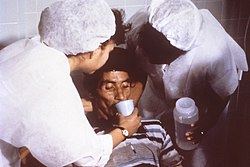Dehydration

Editor-In-Chief: Prab R Tumpati, MD
Obesity, Sleep & Internal medicine
Founder, WikiMD Wellnesspedia &
W8MD's medical weight loss NYC, sleep center NYC
Philadelphia medical weight loss and Philadelphia sleep clinics
| Dehydration | |
|---|---|

| |
| Synonyms | N/A |
| Pronounce | N/A |
| Specialty | N/A |
| Symptoms | Thirst, dry mouth, dark urine, dizziness, fatigue |
| Complications | Heat injury, kidney failure, seizures, hypovolemic shock |
| Onset | Acute or chronic |
| Duration | Varies |
| Types | N/A |
| Causes | Diarrhea, vomiting, excessive sweating, burns, inadequate fluid intake |
| Risks | Infants, elderly, athletes, people with chronic illnesses |
| Diagnosis | Physical examination, blood test, urinalysis |
| Differential diagnosis | Diabetes insipidus, adrenal insufficiency, hypercalcemia |
| Prevention | Adequate fluid intake, oral rehydration solutions |
| Treatment | Oral rehydration therapy, intravenous therapy |
| Medication | N/A |
| Prognosis | Good with treatment |
| Frequency | Common |
| Deaths | N/A |
Dehydration is a physiological state that occurs when there is an excessive loss of water from the body. It is a serious and potentially life-threatening condition, especially if not promptly recognized and treated.
Pathophysiology[edit]
Under normal circumstances, the human body maintains a delicate balance of water and electrolytes to function optimally. Dehydration upsets this balance, resulting in reduced water content in the body's cells and blood vessels. This situation can have a widespread impact, affecting everything from the skin and mucous membranes to the circulatory system and central nervous system.
Causes[edit]
Several factors can lead to dehydration. These include inadequate fluid intake, excessive sweating due to high temperatures or physical exertion, prolonged vomiting or diarrhea, diabetes, excessive alcohol consumption, and certain medications such as diuretics. Conditions that hinder fluid intake, like a sore throat or an intestinal obstruction, can also contribute to dehydration.
Symptoms[edit]
Dehydration can manifest through a variety of symptoms. Common signs include excessive thirst, dry mouth and throat, decreased urine output and dark-colored urine, fatigue, dizziness, and confusion. In severe cases, low blood pressure, rapid heart rate, fever, sunken eyes, and in extreme cases, loss of consciousness can occur.
Diagnosis[edit]
Diagnosis of dehydration typically involves a thorough clinical examination, focusing on signs such as skin elasticity, the color and volume of urine, and the patient's level of consciousness. Blood tests may be ordered to check electrolyte levels and kidney function, while urinalysis can help identify the concentration of the urine.
Treatment[edit]
The primary treatment for dehydration is fluid replacement to restore the body's water and electrolyte balance. This can be achieved through drinking fluids containing electrolytes, or in severe cases, through intravenous fluid administration. It's also crucial to treat the underlying cause of dehydration to prevent recurrence.
Prevention[edit]
Prevention of dehydration involves ensuring adequate fluid intake, particularly during hot weather, illness, or periods of high physical activity. Those with chronic illnesses such as diabetes or kidney disease, as well as the elderly and infants, should be especially mindful of hydration, as they are at a higher risk of dehydration.
|
|
|
| Acid–base disorders | ||||||
|---|---|---|---|---|---|---|
|
Ad. Transform your life with W8MD's Budget GLP-1 injections from $75


W8MD offers a medical weight loss program to lose weight in Philadelphia. Our physician-supervised medical weight loss provides:
- Weight loss injections in NYC (generic and brand names):
- Zepbound / Mounjaro, Wegovy / Ozempic, Saxenda
- Most insurances accepted or discounted self-pay rates. We will obtain insurance prior authorizations if needed.
- Generic GLP1 weight loss injections from $75 for the starting dose.
- Also offer prescription weight loss medications including Phentermine, Qsymia, Diethylpropion, Contrave etc.
NYC weight loss doctor appointmentsNYC weight loss doctor appointments
Start your NYC weight loss journey today at our NYC medical weight loss and Philadelphia medical weight loss clinics.
- Call 718-946-5500 to lose weight in NYC or for medical weight loss in Philadelphia 215-676-2334.
- Tags:NYC medical weight loss, Philadelphia lose weight Zepbound NYC, Budget GLP1 weight loss injections, Wegovy Philadelphia, Wegovy NYC, Philadelphia medical weight loss, Brookly weight loss and Wegovy NYC
|
WikiMD's Wellness Encyclopedia |
| Let Food Be Thy Medicine Medicine Thy Food - Hippocrates |
Medical Disclaimer: WikiMD is not a substitute for professional medical advice. The information on WikiMD is provided as an information resource only, may be incorrect, outdated or misleading, and is not to be used or relied on for any diagnostic or treatment purposes. Please consult your health care provider before making any healthcare decisions or for guidance about a specific medical condition. WikiMD expressly disclaims responsibility, and shall have no liability, for any damages, loss, injury, or liability whatsoever suffered as a result of your reliance on the information contained in this site. By visiting this site you agree to the foregoing terms and conditions, which may from time to time be changed or supplemented by WikiMD. If you do not agree to the foregoing terms and conditions, you should not enter or use this site. See full disclaimer.
Credits:Most images are courtesy of Wikimedia commons, and templates, categories Wikipedia, licensed under CC BY SA or similar.
Translate this page: - East Asian
中文,
日本,
한국어,
South Asian
हिन्दी,
தமிழ்,
తెలుగు,
Urdu,
ಕನ್ನಡ,
Southeast Asian
Indonesian,
Vietnamese,
Thai,
မြန်မာဘာသာ,
বাংলা
European
español,
Deutsch,
français,
Greek,
português do Brasil,
polski,
română,
русский,
Nederlands,
norsk,
svenska,
suomi,
Italian
Middle Eastern & African
عربى,
Turkish,
Persian,
Hebrew,
Afrikaans,
isiZulu,
Kiswahili,
Other
Bulgarian,
Hungarian,
Czech,
Swedish,
മലയാളം,
मराठी,
ਪੰਜਾਬੀ,
ગુજરાતી,
Portuguese,
Ukrainian


